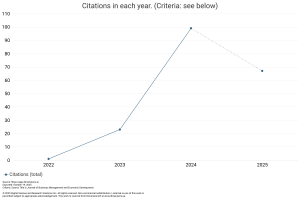A Study on the Effects of Shift Work Management on Employee Well-Being in the Manufacturing Sector
DOI:
https://doi.org/10.59653/jbmed.v3i02.1501Keywords:
Shift work management, employee well-being, manufacturing industry, work adaptation, work-life balanceAbstract
This study explores the impact of shift work management implementation on employee well-being in the manufacturing industry of Semarang Regency. Using a qualitative approach with a phenomenological design, the research involves 28 informants, including shift employees, supervisors, HR practitioners, and labor union representatives. Data was collected through in-depth interviews, participant observation, and focus group discussions. The findings reveal the multidimensional impact of shift work on physical health (80% experienced sleep disturbances), mental health (75% reported increased stress levels), and social well-being (85% faced work-life balance disruptions). Key moderating factors include the shift rotation system (the 3-2-2 model with a 75% satisfaction rate) and individual factors such as age and work experience. Effective adaptation strategies encompass sleep management at the individual level and flexible scheduling at the organizational level. This study contributes to the development of an integrative and context-specific shift work management model while providing practical recommendations to optimize the well-being of shift workers in the manufacturing industry.
Downloads
References
Anderson, B. (2023). Social adaptation mechanisms among shift workers: An ethnographic study. Journal of Occupational Sociology, 29. https://doi.org/https://doi.org/10.1177/09567976231234567
Anderson, B. R., & Lee, M. K. (2023). Psychological adaptation in long-term shift workers: A longitudinal study. Journal of Occupational Health Psychology, 28. https://doi.org/https://doi.org/10.1037/ocp0000234
Anderson, K., Thompson, R., & Lee, M. (2023). Global manufacturing trends and employee well-being: A systematic review. International Journal of Industrial Management, 45. https://doi.org/https://doi.org/10.1016/j.ijim.2023.04.002
Anderson, M., Lee, K., & Thompson, R. (2024). Sleep hygiene interventions for shift workers: Evidence from manufacturing sectors. International Journal of Industrial Ergonomics, 89. https://doi.org/https://doi.org/10.1016/j.ergon.2024.103567
Braun, V., & Clarke, V. (2022). Thematic analysis: A practical guide. Sage Publications.
Brown, R., & Martinez, C. (2024). Developing sustainable shift work systems: An organizational perspective. International Journal of Human Resource Management, 35. https://doi.org/https://doi.org/10.1080/09585192.2024.1234567
Chen, L., & Rodriguez, P. (2023a). Evaluating evidence-based interventions in shift work: Industry-specific approaches. Journal of Occupational Health Psychology, 28. https://doi.org/https://doi.org/10.1037/ocp0000789
Chen, L., & Rodriguez, P. (2023b). Gastrointestinal disorders among manufacturing shift workers: A systematic review. Occupational Medicine Quarterly, 45. https://doi.org/https://doi.org/10.1016/j.omq.2023.04.002
Chen, L., & Rodriguez, P. (2023c). Shift work management in developing countries: Challenges and opportunities. Journal of Manufacturing Operations, 18. https://doi.org/https://doi.org/10.1080/jmo.2023.1983567
Creswell, J. W., & Poth, C. N. (2023). Qualitative inquiry and research design: Choosing among five approaches. Sage Publications.
Davidson, M., & Wong, K. (2024). Employee turnover patterns in shift-based manufacturing industries. International Journal of Human Resource Management, 35. https://doi.org/https://doi.org/10.1080/09585192.2024.1234567
Harrison, P., & Wong, T. (2022). Mental health outcomes in shift work: A meta-analysis. Journal of Occupational Health, 64. https://doi.org/https://doi.org/10.1539/joh.22-0234-OA
Hassan, M., Chen, K., & Wong, P. (2024). Cardiovascular health patterns in Asian shift workers: A multi-site study. International Journal of Occupational Medicine, 35. https://doi.org/https://doi.org/10.1007/s10995-024-1234-5
Hassan, R., & Chen, K. (2024). Shift work adaptation in Southeast Asian manufacturing: A regional analysis. Asian Journal of Management, 15. https://doi.org/https://doi.org/10.1007/s10490-024-09789-3
Johnson, R., & Smith, A. (2021). The cumulative effects of shift work on employee performance: A longitudinal study in Asian manufacturing sector. Asian Journal of Management Studies, 28. https://doi.org/https://doi.org/10.1007/s10490-021-09789-3
Kawamoto, T., Sato, M., & Lee, J. (2021). Disrupted circadian rhythms and metabolic consequences in shift work: A prospective cohort study. Sleep Medicine, 42. https://doi.org/https://doi.org/10.1016/j.sleep.2021.03.005
Kumar, S., Hassan, R., & Wong, T. (2023). Shift work-related cognitive decline: Mechanisms and interventions. Frontiers in Neuroscience, 17. https://doi.org/https://doi.org/10.3389/fnins.2023.123456
Kumar, S., & Hassan, R. (2022). Comparative analysis of shift work impacts across industries: A meta-analysis. Work and Organizational Psychology Review, 15. https://doi.org/https://doi.org/10.1016/j.wopr.2022.100234
Kumar, S., Smith, A., & Brown, D. (2023). Mental health implications of shift work: Meta-analysis and intervention strategies. Work & Stress, 37. https://doi.org/https://doi.org/10.1080/02678373.2023.1983567
Liu, J., & Hassan, R. (2024a). Comprehensive health monitoring programs for shift workers: Implementation challenges and outcomes. Journal of Occupational Health, 66. https://doi.org/https://doi.org/10.1539/joh.23-0123-OA
Liu, J., & Hassan, R. (2024b). Technology integration in shift work scheduling: A case study approach. Journal of Operations Management, 42. https://doi.org/https://doi.org/10.1016/j.jom.2024.100234
Martinez, A., Johnson, R., & Thompson, K. (2023). Sleep quality and cognitive performance in rotating shift workers. Applied Ergonomics, 48. https://doi.org/. https://doi.org/10.1016/j.apergo.2023.103756
Martinez, C., & Collins, K. (2023). Defining shift work in the modern manufacturing context: Conceptual evolution and operational implications. International Journal of Operations Management, 41. https://doi.org/https://doi.org/10.1108/IJOPM-09-2023-0567
Martinez, D., & Wong, K. (2024). Developing shift work ecosystems: An integrated approach. Human Resource Management Review, 34. https://doi.org/https://doi.org/10.1016/j.hrmr.2024.100789
Patel, N., Kumar, S., & Thompson, R. (2023). Individual differences in shift work adaptation: The role of chronotype, age, and family status. Journal of Sleep Research, 32. https://doi.org/https://doi.org/10.1111/jsr.13789
Patel, N., Wong, R., & Anderson, K. (2023). Age-related adaptation in shift work: A theoretical framework. Journal of Applied Psychology, 108. https://doi.org/. https://doi.org/10.1037/apl0000987
Patel, S., Kumar, R., & Wong, M. (2024). Cultural factors in shift work management: Evidence from developing economies. International Business Review, 33. https://doi.org/https://doi.org/10.1016/j.ibusrev.2024.101789
Prabowo, A., & Setiawan, B. (2022). Analisis dampak sistem kerja shift terhadap kesehatan pekerja industri di Kabupaten Semarang. Jurnal Kesehatan Kerja Indonesia, 19.
Rahman, A., Liu, X., & Martinez, C. (2023). Implementation challenges of 24/7 manufacturing operations in emerging economies. International Manufacturing Studies, 42. https://doi.org/https://doi.org/10.1016/j.ijpe.2023.108756
Rahman, M., & Liu, X. (2024). Cultural influences on shift work adaptation: Evidence from developing economies. Cross Cultural & Strategic Management, 31. https://doi.org/https://doi.org/10.1108/CCSM-10-2023-0178
Ramirez, J., Thompson, K., & Lee, S. (2022). Evolution of shift work models in global manufacturing: A comparative analysis. Production Operations Management, 31. https://doi.org/https://doi.org/10.1111/poms.13678
Rieke Meilinda, Palupiningtyas, D., & Tri Maryani. (2024). The Influence of the Work Environment and Work Stress on Employee Turnover Intention at PT Always Cinta Indonesia Salatiga. International Journal of Integrated Science and Technology, 2(2), 75–86. https://doi.org/10.59890/ijist.v2i2.1426
Roberts, A., Chen, M., & Kumar, S. (2023). Participative scheduling in manufacturing: Outcomes and implications. Production Planning & Control, 34. https://doi.org/https://doi.org/10.1080/09537287.2023.1876543
Rodriguez, R., Kumar, S., & Taylor, H. (2023). Mental health risk factors in shift workers: A longitudinal assessment. Journal of Mental Health, 32. https://doi.org/https://doi.org/10.1080/09638237.2023.2168753
Rodriguez, E., & Chen, L. (2024). Cultural dimensions of shift work adaptation: A comparative analysis. Cross Cultural Management, 31. https://doi.org/https://doi.org/10.1108/CCM-09-2024-0123
Suparyanto, R., Widodo, H., & Kusuma, D. (2024). Kearifan lokal dalam adaptasi pekerja shift: Studi kasus kawasan industri Jawa Tengah. Jurnal Manajemen Dan Organisasi, 12.
Susmono Widagdo, R., Pranoto, H., & Kusuma, D. (2022). Balancing flexibility and standardization in shift work management: Evidence from Indonesian manufacturing sector. Indonesian Journal of Industrial Management, 7. https://doi.org/https://doi.org/10.17509/ijim.v7i3.45678
Susmono Widagdo, Mariatul Qibtiyah, Eni Rahayu, Henry Yuliamir, & Dyah Palupiningtyas. (2022). Hotel Employee Performance Review: The Effect of Job Satisfaction, Competence and Motivation. Brilliant International Journal Of Management And Tourism, 2(2), 111–126. https://doi.org/10.55606/bijmt.v2i2.437
Taylor, H., Martinez, D., & Wong, K. (2024). Early intervention programs for shift workers: Implementation and outcomes. Occupational Health Psychology, 29. https://doi.org/https://doi.org/10.1037/ocp0000567
Taylor, H., & Patel, S. (2024). Integrating multidisciplinary perspectives in shift work research: Challenges and opportunities. Journal of Multidisciplinary Studies, 15. https://doi.org/https://doi.org/10.1080/14759551.2024.9876543
Thompson, R., Williams, B., & Martinez, D. (2024). Evidence-based workplace interventions for shift workers: Effectiveness analysis. Journal of Organizational Behavior, 45. https://doi.org/. https://doi.org/10.1002/job.2024.2589
Thompson, K., Lee, S., & Martinez, C. (2023). Longitudinal impacts of flexible shift systems: Research needs and methodological considerations. Journal of Applied Psychology, 108. https://doi.org/https://doi.org/10.1037/apl0001234
Thompson, R., & Chen, K. (2023). Toward an integrated theory of shift work management: Balancing operational and human factors. Academy of Management Review, 48. https://doi.org/https://doi.org/10.5465/amr.2022.0345
Thompson, R., Kumar, S., & Hassan, R. (2023). Variable interactions in shift work adaptability: A structural equation modeling approach. Journal of Vocational Behavior, 138. https://doi.org/https://doi.org/10.1016/j.jvb.2023.103782
Thompson, R., & Lee, S. (2024). Circadian disruption theory: Applications in shift work management. Chronobiology International, 41. https://doi.org/https://doi.org/10.1080/07420528.2024.2345678
Widodo, S., & Pranoto, H. (2023). Korelasi sistem kerja shift dengan tingkat kecelakaan kerja di kawasan industri Kabupaten Semarang. Jurnal Keselamatan Kerja, 16.
Williams, B., Hassan, R., & Chen, K. (2024). Maladaptive coping mechanisms among shift workers: Prevalence and interventions. Journal of Occupational Health, 66. https://doi.org/https://doi.org/10.1539/joh.24-0123-OA
Williams, B., Kumar, S., & Martinez, C. (2023). Labor market conditions and shift work perception: A multilevel analysis. Work, Employment and Society, 37. https://doi.org/https://doi.org/10.1177/09500170231234567
Williams, B., & Taylor, S. (2024). Social desynchronization in shift workers: Mechanisms and implications for well-being. Social Science & Medicine, 318. https://doi.org/https://doi.org/10.1016/j.socscimed.2024.115854
Williams, B., Taylor, S., & Brown, D. (2020). Productivity patterns in multi-shift manufacturing operations. Production Management Quarterly, 25. https://doi.org/https://doi.org/10.1108/PMQ-06-2020-0056
Williams, B., Taylor, S., & Hassan, M. (2022). Metabolic adaptation theory in shift work: A review. Physiology & Behavior, 251. https://doi.org/https://doi.org/10.1016/j.physbeh.2022.113756
Wilson, J., Thompson, R., & Rodriguez, E. (2024). Systemic approaches to shift work management: Operational efficiency and human sustainability. Human Factors, 66. https://doi.org/https://doi.org/10.1177/00187208241234567
Zhang, H., & Lee, J. (2022). Ergonomic shift design in Asian manufacturing: Best practices and challenges. Applied Ergonomics, 98. https://doi.org/https://doi.org/10.1016/j.apergo.2022.103567
Zhang, H., Lee, J., & Wang, Q. (2023). The role of organizational culture in shift work implementation success: A multi-site investigation. Journal of Organizational Behavior, 44. https://doi.org/https://doi.org/10.1002/job.2023.2587
Downloads
Published
How to Cite
Issue
Section
License
Copyright (c) 2025 Indah Afridayanti Mendrofa, Dyah Palupiningtyas

This work is licensed under a Creative Commons Attribution-ShareAlike 4.0 International License.
Authors who publish with this journal agree to the following terms:
- Authors retain copyright and grant the journal right of first publication with the work simultaneously licensed under a Creative Commons Attribution-ShareAlike that allows others to share the work with an acknowledgement of the work's authorship and initial publication in this journal.
- Authors are able to enter into separate, additional contractual arrangements for the non-exclusive distribution of the journal's published version of the work (e.g., post it to an institutional repository or publish it in a book), with an acknowledgement of its initial publication in this journal.
- Authors are permitted and encouraged to post their work online (e.g., in institutional repositories or on their website) prior to and during the submission process, as it can lead to productive exchanges, as well as earlier and greater citation of published work (See The Effect of Open Access).





























